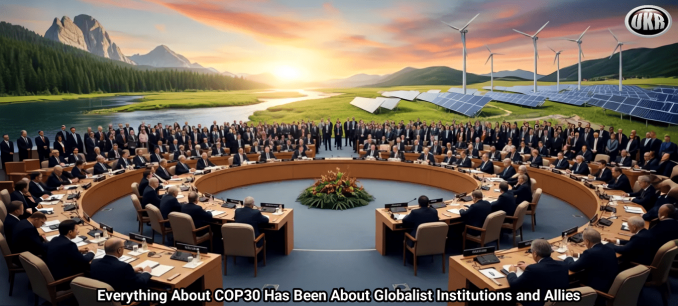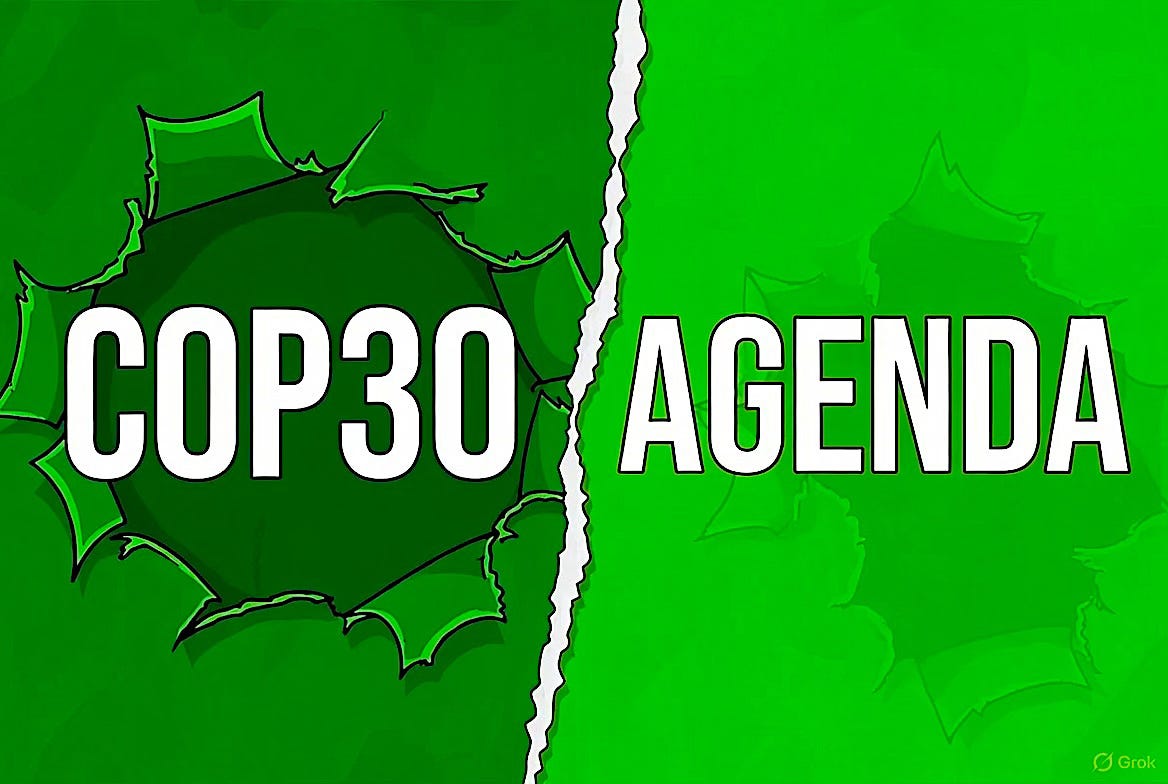
Everything About COP30 Has Been About Globalist Institutions and Allies, Whom Ordinary People Are Expected to Pay and Obey
MELANIE COLLETTE
Guest Post from Melanie Collette at CFact.
In COP30’s opening week in Belém, delegates keep repeating the same line: this is the “people-centered” and “implementation” COP. Brazil’s President Luiz Inácio Lula da Silva insists that “climate change is no longer a threat of the future; it is a tragedy of the present,” and urges “yet another defeat to denialism.”
Those lines sound compassionate, but once you read the declarations and watch the sessions, “people-centered” and “truth” serve as a cover for a shift toward international institutions and their allies, from whom ordinary people are expected to pay and obey.
The trillion-dollar cash machine
COP29 and COP30 produced the Baku to Belém Roadmap to 1.3T, a plan to scale climate finance to $1.3 trillion a year by 2035. The UNFCCC report frames this as expanding climate finance through grants and concessional instruments, routed through climate funds and development banks.

But the exact roadmap also pushes “innovative sources” of public revenue: new levies on fossil fuels, global taxes on financial transactions, and “ultra-high net worth individuals.” Once those pipelines are in place, voters will have little say over where the money goes or what conditions come with it.
Making industrial planning “irreversible”
On November 14, at COP30’s High-Level Event of the Global Initiative for Information Integrity on Climate Change, governments and UN agencies launched the Belém Declaration on Global Green Industrialization — a framework to recalibrate heavy industry, mining, and manufacturing around centrally coordinated decarbonization.
In a press release, Brazil’s vice president praises green industry for creating “future-oriented jobs,” and COP30 CEO Ana Toni goes further: “Green industrialization is now an irreversible agenda, and we need to work together to ensure that all countries advance in the best way possible.” No parliament ever voted to make industrial planning irreversible. Yet that is precisely the point: to lock in one model of industrial policy and make it costly for future governments to choose another path.
Turning health systems into climate instruments
On November 13, at COP30’s Health and Climate Ministerial Meeting, the World Health Organization released the Belém Health Action Plan, outlining the adaptation of the health sector to climate change. In WHO-linked commentary on the plan, partners praise it for establishing “adaptation of the health sector to climate change as an international priority” and for calling for “holistic, cross-sectoral strategies” with “community engagement and participation as foundational to implementation.”
That is bureaucratic language for telling health systems to treat climate objectives as a central organizing principle, not just a risk factor to manage. Once climate adaptation for health is elevated to a cross-sector “international priority,” you’re talking about deep, long-term influence over health governance, budgets, and infrastructure — well beyond the targeted resilience investments local communities might actually choose.
Policing “truth” about climate policy
On November 12, during COP30’s High-Level Event of the Global Initiative for Information Integrity on Climate Change at the Brazilian Pavilion, UNESCO and a group of governments launched the Declaration on Information Integrity on Climate Change.
The declaration states that it is “concerned by the growing impact of disinformation, misinformation, [and] denialism” and warns that this poses a threat to “the global climate response and societal stability.” It calls on states to adopt legal frameworks and on digital platforms to modify their systems and algorithms to promote “healthy information environments” that align with the UNFCCC and the Paris Agreement.
After years of seeing COVID and election “misinformation” rules turned on inconvenient — but ultimately vindicated — critics, it’s impossible to pretend this is anything but partisan. When the same cluster of activists and officials pushing new levies and mandates also claim the authority to decide what counts as “integrity” and “truth,” they’re not defending science. They’re building a shield around their agenda and putting dissent in the penalty box.
A better, genuinely people-centered alternative
A genuinely people-centered climate approach would begin with respect for national sovereignty and freedom of speech, rather than global tax schemes and algorithmic policing. It would allow countries to choose affordable, reliable energy that suits their circumstances, rather than enforcing one-size-fits-all timetables drafted in UN backrooms. It would focus on practical resilience — stronger grids, functioning water and sewer systems, drainage, seawalls, and early-warning networks — rather than endlessly elaborating new financial architectures.
And it would trust free people in free markets. Innovation, competition, and secure property rights have done more to lift people out of poverty and clean up the environment than any summit or conference. With days of negotiations still ahead, if COP30 in Belém is remembered as the “COP of truth,” it should be because citizens saw the truth: behind the rainforest backdrop and people-friendly branding, this process is concentrating power far from the people it claims to serve.
Melanie Collette is a CFACT Policy Analyst. She has a background in environmental and energy policy work, especially in combating the offshore wind turbine groups and green organizations in their plans for northeast construction of wind farms up and down the Atlantic coast.
This article (Everything About COP30 Has Been About Globalist Institutions and Allies, Whom Ordinary People Are Expected to Pay and Obey) was created and published by Energy Security and Freedom and is republished here under “Fair Use” with attribution to the author Melanie Collette
See Related Article Below
Nothing That’s Happened at COP30 Matters in the Real World: It’s Merely Entertainment for Those Who Do the Real Work
THOMAS J SHEPSTONE
Did you know that just the mention of “fossil fuels” has engendered a tremendous debate at the COP3O gathering of folks who have nothing better to do? Well, it has, according to this report from the Canadian CDBC:
The COP30 climate summit was headed for a showdown on Friday over the future of fossil fuels after host Brazil dropped efforts to develop a global plan to shift away from oil, gas and coal from its proposed deal.
A draft text for a deal for this year’s UN climate summit, released before dawn on Friday, contained no reference to fossil fuels, dropping entirely a range of options on the subject that had been included in an earlier version.
The issue has been one of the most contentious at the two-week conference of nearly 200 governments in Brazil’s Amazon city of Belem.
A group of more than 30 nations sent a letter to the COP30 presidency late on Thursday saying they could not accept a deal that failed to include a commitment to develop a roadmap to transition away from fossil fuels.

So, who are these 30 countries? Well, I asked Perplexity and got this:
- Antigua and Barbuda
- Austria
- Bahamas
- Bahrain
- Barbados
- Belgium
- Belize
- Brazil
- Bulgaria
- Cabo Verde
- Chile
- Colombia
- Comoros
- Cook Islands
- Costa Rica
- Croatia
- Cuba
- Cyprus
- Czech Republic
- Denmark
- Dominica
- Dominican Republic
- Estonia
- Fiji
- Finland
- France
- Georgia
- Germany
- Greece
- Grenada
So, a bunch of Europeans wearing green eyeshades, a few communists and socialists such as Brazil, and a whole lot of nations that don’t matter much.
And, who didn’t sign (including the U.S., which wisely didn’t attend)? Per Perplexity:
- China: about 24-27% of global primary energy production
- United States: about 14-16%
- Russia: about 10-12%
- Saudi Arabia: about 5-6%
- India: about 4-5%
- Canada: about 2-3%
- Nigeria: about 2%
Together, these seven countries produce roughly 60-65% of the world’s primary energy, according to Perplexity.
So, there it is. The countries that do matter when it comes to primary energy have told the worthless UN it can play in its little sandbox if it wishes, but nothing it does is going to have the slightest impact on real-world events or exploding demands for energy world-wide. Even Canada gets it. COP30 has shown us it’s all over except for the sputtering.
This article (Nothing That’s Happened at COP30 Matters in the Real World: It’s Merely Entertainment for Those Who Do the Real Work) was created and published by Energy Security and Freedom and is republished here under “Fair Use” with attribution to the author Thomas J Shepstone






Leave a Reply